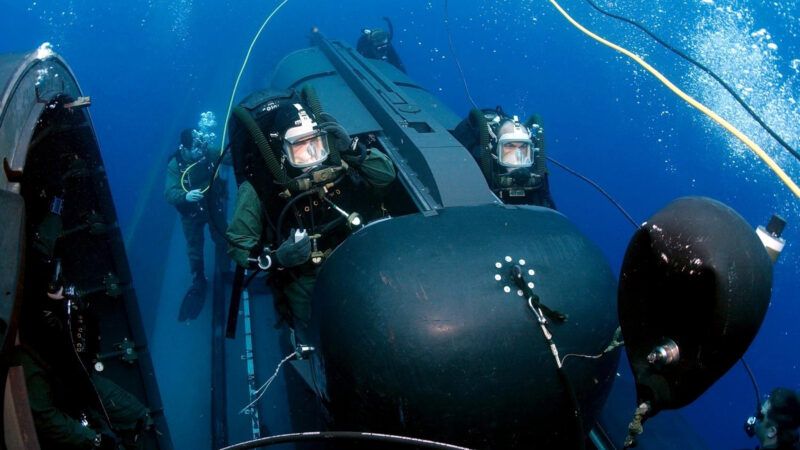Navy SEALs Reportedly Killed North Korean Fishermen and Mutilated Their Bodies To Hide a Failed Mission
It’s impossible to tell how many other times U.S. special operations failed and killed innocent bystanders in the process.

You are a fisherman in one of the poorest, most repressed countries in the world. About 20 years ago, your country was suffering from a famine that is still forbidden to discuss frankly. The streets are filled with living reminders of starvation, people whose bodies are marked by childhood malnutrition. Food is precious to you.
So today, as other days, you woke up before dawn with your companions to go diving in the freezing cold ocean, in hopes of putting some mussels on your family's table. But suddenly, you die. A man you have never met and whose presence you did not know about has shot you with his rifle. His companions stab your lungs so that your body will sink to the bottom of the sea. Your family will likely never know what happened to you.
That is what happened to a group of unnamed North Korean fishermen who accidentally stumbled upon a detachment of U.S. Navy SEALs in 2019, according to a Friday report by The New York Times. The commandos had set out to install a surveillance device to wiretap government communications in North Korea. When they stumbled upon an unexpected group of divers on a boat, the SEALs killed everyone on board and retreated.
The U.S. government concluded that the victims were "civilians diving for shellfish," sources told the Times. Officials didn't even know how many, telling the Times that it was "two or three people," even though the SEALs had searched the boat and disposed of the bodies. The mission wasn't just an intelligence failure. It was a failure that killed real people through no fault of their own.
The mission was carried out during the first Trump administration. The U.S. government wanted insight into North Korean leader Kim Jong Un during his high-stakes nuclear negotiations with President Donald Trump. Matthew Cole, one of the reporters who broke the story, wrote on his Substack that he first caught wind of the story in 2023 from a source who wanted him to know "how the SEALs involved in the mission had avoided any accountability because of how secret the mission was."
The broader point of the story, according to the Times, was that the U.S. government "often" hides the failures of special operations from policymakers. Seth Harp, author of The Fort Bragg Cartel, roughly estimates that Joint Special Operations Command killed 100,000 people during the Iraq War "surge" from 2007 to 2009. The secrecy around America's spying-and-assassination complex makes it impossible to know how many of those people were simply in the wrong place at the wrong time.
The fact that the North Korean incident is not tied to any ongoing conflict likely made it safer for Cole's source to share than other, more recent failures. But it's almost certain that there are other stories like it—and that there will be even more in the future, given that the second Trump administration has threatened to use special forces for its new hot war on drug cartels.
By the sources' telling, SEAL Team Six had sailed to the North Korean coast in two mini-submarines under a communications blackout, which meant that they lacked the livestreamed intelligence they were used to having. Based on aerial surveillance beforehand, the military planners had concluded that this part of North Korea was supposed to be free of boat traffic at that hour of the night in the winter.
Some of the SEALs swam to shore while others stayed in the submarines. When a leader of the shore team saw flashlights coming from a boat and a man jumping into the water, he opened fire without any discussion. Then the shore team swam to dispose of the bodies—trying to sink them so that they couldn't be found—and then they sent a distress signal to evacuate. There were no weapons or uniforms on the boat. Afterward, the Times reports, "U.S. spy satellites detected a surge of North Korean military activity in the area," which could have been because someone heard the gunshots and spotted strange movements, or because a group of fishermen were lost at sea.
Of course, it's hard to know exactly what it was like to be on the coast that night, from details filtered through a leak to a newspaper. But this version of the story, which ultimately came from the SEALs themselves, sure sounds like they killed a group of men for no good reason. It's not even a case of hitting bystanders in the heat of battle; the mission wasn't supposed to involve combat at all. And if the SEALs had to evacuate because their cover was already blown, what was the point of trying to sink the bodies to the bottom of the ocean?
In his blog post, Cole called for "more public information about how the government operates in secrecy." (Hopefully, his reporting helps bring the fishermen's families some closure, if the information ever filters through tight North Korean censorship.) Any type of military intervention, however, is going to involve some degree of skullduggery that has to be hidden from public view. And secrecy will breed abuse. The only sure way to cut down on incidents like the murder of random fishermen is to scale back America's imperial ambitions and stop getting involved in conflicts of choice.


Show Comments (54)